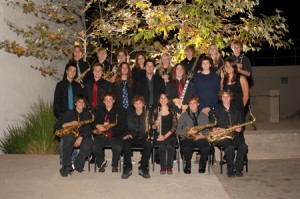
Laguna Beach’s school booster groups have a new set of marching orders, advised to use strict new guidelines that bar them from requiring parents to pay participation fees for their student’s extra-curricular activities, including spirit fees for sports teams, and also limits the way they can ask for donations from parents.
Teachers and boosters organizations alike are now struggling to make up shortfalls due to the new prohibitions, imposed as a result of a legal battle over compliance with state laws mandating a “free public education.”
“We know anecdotally that this year parent contributions to boosters groups are down significantly,” said Supt. Sherine Smith. “It appears that when a fee is not required, fewer parents are inclined to support co-curricular or extracurricular programs.”
An example of the new policy’s impact hit the band program. School officials have come up short in supplying musical instruments to students, who generally rented them on their own, Smith said. Instead of specifying their financial need to band boosters, schools officials made an urgent request last week to Schoolpower, the nonprofit that has raised enrichment funds for Laguna schools for years.
Since students need the instruments now, the district asked SchoolPower to provide about half the instrument cost of $78,000, with the district providing the remaining cost of about $87,000. (is 87,000 the cumulative cost or in addition to 78,000? )
SchoolPower’s board has yet to meet and take up the issue, though its president, Marcus Skenderian, expects the group will assist and plans a musical instrument drive for the district.
The lawsuit by the American Civil Liberties Union claimed that some local school districts denied students their right to a free public education by charging improper fees for classes and extracurricular activities. The suit was all but settled last December, based on the anticipated passage of a law that would require posting a notice in every public classroom about donation compliance and how to file complaints. But Gov. Jerry Brown vetoed the bill on Oct. 9.
Thus, the onus lies with individual school districts to ensure compliance with the “free public education” law.
Jennifer DeGroote, president of the high school’s Athletic Boosters, recently received special training from district officials about how to proceed with donation requests and issued an e-mail directive to other volunteers last week. The most crucial message booster group must articulate is that all donations are voluntary and that students will not be treated differently or adversely if parents choose not to donate.
To avoid slip-ups in communications to parents, all donation requests must now be channeled through DeGroote and only designated booster representatives, who have signed a special compliance form, can send out such communications.
DeGroote pointed out that the ACLU can still sue individual districts for lack of compliance since the suit was not settled. Moreover, boosters could lose their 501(c)(3) status for violations.
The new guidelines create more red tape for volunteers, and also inhibit the ability of boosters or teachers to make a specific request, such as covering uniform costs.
Parent Laura Tarbox, team mom for girls basketball, said the inability to identify team needs results in a costly lack of transparency that depresses donation rates. “If they are not asked, or made aware in some way, it won’t happen,” she said.
Music booster Karen Kanner said asking for donations rather than charging a fee makes planning programs, such as attending music competitions, difficult. “It’s hard to make a budget without any guarantee of income,” she said.
The district’s turning to SchoolPower may prove prophetic and raises the question of whether SchoolPower will be asked to fill in other gaps. “The challenge we’re having is that we don’t really know how it’s going to impact us,” said Skenderian.
Tarbox, a member of SchoolPower’s endowment board, expressed concern that “our schools will not be able to offer as many special programs in the future if we cannot ask parents to pay anything for them. SchoolPower will not be able to fund everything.”




